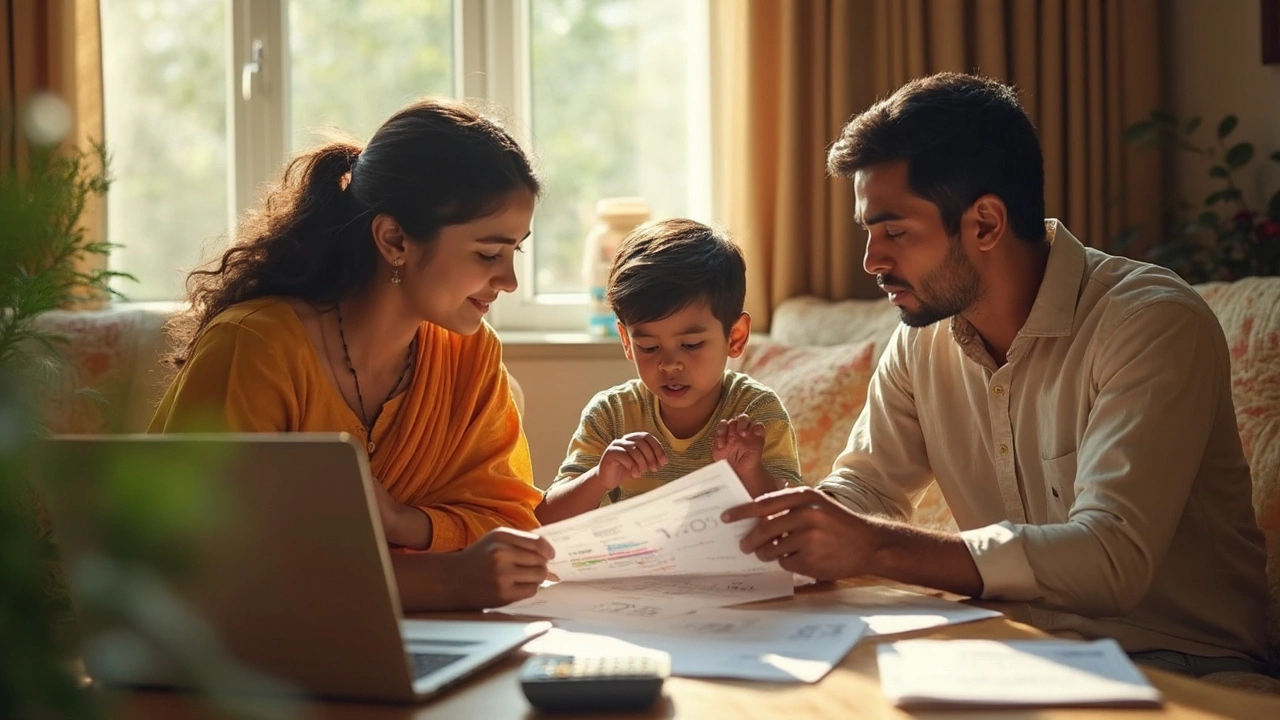What Lowers Property Value the Most?

Thinking about buying a property but worried about what might tank its value? Knowing what to look out for can save you big bucks. Sometimes, it's not just about the paint color or the size of the yard.
One major buzzkill? Noisy neighbors. Imagine shelling out a chunk of your savings only to be serenaded by barking dogs or late-night parties. It's annoying and, worse, makes future buyers less keen to take the plunge.
Another sneaky factor? Being close to certain facilities. Yeah, things like landfills aren't exactly charming. Even a nearby airport can make selling your home later a tricky affair due to constant noise.
- The Impact of Noisy Neighbors
- Proximity to Undesirable Facilities
- School District Concerns
- Poor Maintenance and Condition
- Neighborhood Crime Rates
- Market Timing and Conditions
The Impact of Noisy Neighbors
Ever thought about how much those loud next-door parties could cost you? The impact of noisy neighbors on property value is often underestimated but very real. When you're trying to enjoy a quiet evening, nothing is worse than noise bleeding through your walls. Buyers feel the same way, and it can seriously put them off.
Studies have shown that constant noise doesn't just drive folks up the wall—it also pushes property prices down. Noise pollution can lower property values by up to 10%. Imagine losing that chunk of value just because your neighbor's garage band practices every night.
But it's not just about parties. Everything from barking dogs to loud arguments can contribute to the chaos. If you're planning to buy or sell, it's worth taking the vibe of the street into account. What can you do if you find yourself stuck in this scenario?
- Assess Before You Buy: Spend some time in the neighborhood, especially during the evening or weekends, to gauge the noise levels. This firsthand experience might just save you from future headaches.
- Soundproofing: If you're already stuck with rowdy neighbors, investing in soundproofing measures like solid-core doors and thicker windows can make a noticeable difference.
- Community Engagement: Sometimes, talking it out helps. Community meetings or simple conversations could solve minor issues and improve the living environment.
- Legal Avenues: In extreme cases, you might need to look into noise ordinances and see what legal steps you can take to restore some peace.
All said, the best tactic is prevention. When shopping for a new place online, use virtual tours or neighborhood reviews to catch any red flags regarding noise. It’s about picking a spot that's more peaceful than pesky.
Proximity to Undesirable Facilities
Imagine buying a dream home only to find it near not-so-pleasant spots. Being close to certain facilities can really knock your property value down a few notches. While some might think twice about convenience over peacefulness, the long-term effect on investment is worth noting.
First up, living near airports might seem thrilling to aviation enthusiasts but not if you're trying to sell a home. The constant hustle and bustle, combined with noise pollution, can be a major turn-off for potential buyers.
And then there are landfills and waste treatment plants. Sure, they serve a purpose, but the stench and the constant reminder of what's stored there can make living nearby less than idyllic. Not to mention, it's a hard sell point when buyers scout locations online.
Check out this quick look at how proximity affects real estate value:
| Facility | Average Property Value Reduction |
|---|---|
| Airport | 7-15% |
| Landfill | 5-10% |
| Waste Treatment Plant | 4-7% |
Also worth mentioning are industrial complexes. While they bring jobs, they can also bring down home investment values. The heavy truck traffic, noise, and sometimes unsightly views can send potential homeowners running the other way.
If you're in the market and buying property online, do a virtual map tour. Tools like Google Maps can reveal these hidden but crucial details. A few clicks can save you heaps in the long run and keep your investment secure.
School District Concerns
When you’re buying a property online, the school district might not be the first thing on your mind. But believe it or not, where a property sits education-wise can seriously affect its value. A home's proximity to a reputable school district can actually boost its price because families prioritize good education for their kids.
Now, here’s the kicker: properties in bad school districts can plummet in value. Even if you don’t have children, future buyers might, and they’re definitely considering this factor. According to a study, homes located in top-rated school districts tend to sell for, on average, 20% more than those in areas with lower-rated schools.
Wondering how you can check on school districts while shopping for your next home? It’s easier than you think. Websites like GreatSchools.org provide ratings and reviews that give you a solid idea of what to expect. School district ratings aren’t the only thing to check out; also look at their funding levels, student-to-teacher ratios, and overall graduation rates.
Here’s a tip: always consider the school district even if you're child-free. Why? Because it’s not just about the kids—it’s about your property value. Bad ratings don’t just mean less-than-stellar education; they often indicate less investment in the area, which can mean more crime and lower property values over time. It’s something to chew on before clicking that 'buy now' button.

Poor Maintenance and Condition
Nothing screams 'stay away' like a property that's falling apart. It's one of the biggest red flags when buying a home online. You might find a place that looks like a steal, but if it's leaking, rotting, or crumbling, you might just be setting yourself up for years of headaches and blowing your budget on repairs.
Let's first talk about the roof. A broken or old roof is a huge expense. If you notice sagging or missing shingles in photos, it's a definite warning sign. This isn't just about keeping the rain out—roof problems can lead to more serious issues like mold and structural damage.
Then there’s the plumbing and electrical systems. Old, outdated, or faulty pipes and wiring can make your life miserable. Imagine having to rip out walls or floors just to fix a chronic leaky pipe or an electrical short circuit. These aren't cheap fixes, folks!
Don't forget about the exterior. Peeling paint, cracked driveways, or overgrown yards might not seem like a big deal, but they do lower your property value. Plus, they signal to potential buyers that the owner might not have been very diligent with maintenance.
Here's a handy list of what to check for when scrolling through listings online:
- Roof Condition: Look for any signs of damage or age.
- Foundation: Cracks can mean future trouble.
- Plumbing & Electrical: Ensure they meet modern standards.
- Exterior Features: Well-maintained paint, yard, and driveway.
- Interior State: Check the photos for any obvious signs of neglect.
In some cases, you might come across properties with fancy descriptions but lack clear images. Always be skeptical about what's hidden. Investing in a thorough inspection before buying can save you from a lot of hassle and costs later.
One interesting stat—properties that have had a recent overhaul in essential maintenance features typically see a boost in value of around 15-20%. So, taking care of the basics isn't just smart—it's financially savvy.
Neighborhood Crime Rates
When it comes to buying property, one of the biggest deal-breakers is a high crime rate in the area. It's a harsh reality, but buyers tend to shy away from places where safety is a concern. Not surprisingly, homes in areas with higher crime rates tend to have their property value drop significantly. This is especially true for people looking to buy a home online, as they may prioritize security above many other factors.
Potential homeowners often check crime statistics websites like NeighborhoodScout or local police department pages to get the lowdown on crime in a particular area. Think about it—who wouldn’t be a bit wary, right?
For those considering real estate as an investment, understanding the impact of crime rates is crucial. People won’t be keen to move into places where they feel unsafe, plain and simple. If a neighborhood has frequent reports of burglaries or violent crimes, it’s not a stretch to see why it would spook potential buyers.
Here is a quick look at the types of crime data that can sway property values:
- Burglary and Theft: These are red flags for potential buyers. Areas with high rates of burglary can lead to lower property values as people seek safer neighborhoods.
- Violent Crimes: Incidents like assaults or robberies heavily impact the decision-making process of home buyers.
- Vandalism: Regular occurrences of vandalism can suggest neglect or lack of community involvement, pushing property values down.
While it's sometimes possible to find bargains in less desirable neighborhoods, if safety improvements aren’t on the horizon, it might not be worth the risk. For those keen on a real estate investment, checking the crime stats should definitely be a priority before signing on the dotted line.
So, always weigh up your comfort and safety when pondering a property buy. After all, peace of mind is priceless, and it might save a lot more than just a few bucks in the long run.
Market Timing and Conditions
When it comes to property value, market timing can be a make-or-break kind of deal. Have you ever heard the phrase "buy low, sell high"? Sounds simple enough, but timing the real estate market is as tricky as catching a wave at the perfect moment.
Real estate cycles can impact how much you pay and, down the road, how much you might get when selling. Generally, markets fluctuate between a buyer's, seller's, and balanced market.
- Buyer's Market: Lots of homes, few buyers—it's a field day for those looking to buy! Prices tend to drop as sellers compete for offers.
- Seller's Market: More buyers than houses for sale. This scarcity drives prices up and gives sellers the upper hand.
- Balanced Market: Supply meets demand, and prices stabilize. It's a relatively safe time for transactions, but don't expect bargains.
Properly timing your real estate purchase could mean avoiding inflated prices or future dips that drop your home's worth like a hot potato. Sure, it involves a lot of guesswork, but understanding these cycles helps big time.
Worried about diving into the market at the wrong time? Keeping tabs on recent sales and trends in your area can give you a clue whether you're heading for a peak or a valley.
Oh, and let's talk interest rates! When they're low, it's like a green light for buyers. But during high-interest periods, your monthly mortgage could become a wallet-drainer, even if the price tag seems fair initially.
For the commitment-phobes out there: renting until the timing feels right could save you from potential buyer's remorse. After all, there's nothing worse than feeling stuck with a property worth less than you paid.
| Market Condition | Impact on Prices |
|---|---|
| Buyer's Market | Tends to Decrease |
| Seller's Market | Tends to Increase |
| Balanced Market | Stabilizes |

